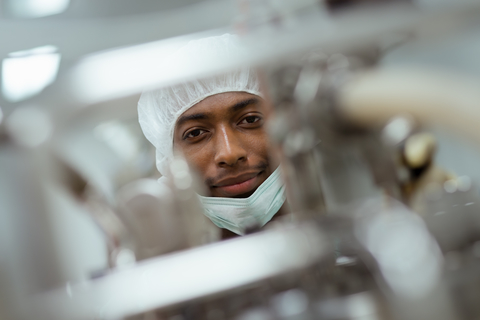Project looks at how face masks affect communication

The Assistive Technologies Innovation Centre (ATiC) at the University of Wales Trinity Saint David is part of a collaborative team helping to understand the benefits of clear face masks in preventing barriers to communication between health care staff and patients.
The use of face masks due to the Covid-19 pandemic has impacted patients who are deaf or who have a hearing impairment as masks block the face of healthcare workers and prevent the use of visual cues such as facial expressions and lip reading. Additionally, hospital environments can be noisy at times and staff can also find it difficult to communicate.
Clear face masks are designed to support communication with patients with hearing impairments and are also beneficial to those with learning disabilities or living with dementia. While it is recognised that facial expression plays a key role in effective communication and that opaque masks interfere with this, the effectiveness of different clear mask designs during verbal and non-verbal communication has not been tested.
UWTSD reports ATiC has worked with Tyddyn Môn and Betsi Cadwaladr University Health Board Audiology Department to understand, test and evaluate user experience by analysing anatomical and emotional responses of a number of representative users wearing a broad selection of face masks.
Context and non-verbal communication play a vital role in human interactions. To get a better understanding of how wearing different face masks can affect communication, ATiC used facial expression recognition software to measure the responses to simulated emotions and facial expressions of users wearing the face masks. This was supported by an evaluation of usability survey data.
The project has been led by Dr Sarah Bent, Principal Clinical Scientist in Audiology at Betsi Cadwaladr UHB, who has been delighted to involve different teams across Wales to support the project.
She said “Right at the start of the pandemic, we knew that face masks would create a significant communication barrier in our Audiology clinics and generally for all people who are hard of hearing or D/deaf. It was fantastic to receive the award from Awyr Las and the support from all on the project team to be able to test and understand the clear view mask options available. One of the masks trialled has since been approved for use in health and social care across the UK.
“We will be shortly publishing the findings from the project, and hope that this will help all manner of services when considering which type of mask or face covering to use, and also inform the development of more options for us in Wales and the UK.”
Michelle Freeman, Chief Executive Officer at Tyddyn Môn, said “The introduction of PPE for our staff teams in supported living, in particular the wearing of covered masks on shift, has resulted in barriers to communication for the adults we support with learning disabilities who need to see facial expressions and those with hearing loss. At the start of the pandemic we were searching for a clear mask with the appropriate safety certification for our staff and we soon realised there wasn’t anything available on the market in the UK.
“It has been a pleasure, through the Health Hack competition, to be part of the Clear Mask project team. Our front line support staff at Tyddyn Môn have contributed to the mask trials evaluating the usability of different clear masks from the UK and the USA and following the project there is a better understanding of the requirements for future clear mask designs. We look forward to a range of certified clear masks being available in the future for all health, social care and education settings.”
Yolanda Rendón-Guerrero, an ATiC Innovation Fellow, who has taken the lead on designing and completing the remote user testing, said “Taking part in this project has granted the ATiC team the opportunity to demonstrate how important it is to involve user centred systems in design processes. This synergy has the power to improve our relationship with products that we use on a daily basis, influencing the health and wellbeing of individuals in the community. There is still a lot of work to be done within this area and we are confident that our research findings will provide a good base for other work to come.”
Dr Sean Jenkins, an ATiC Principal Innovation Fellow, said “This project is particularly important when we consider the challenges facing healthcare professionals caring and communicating with patients under such difficult circumstances. Anything that can be done to support NHS staff in reducing distress and improving patient experience is of immense value and the ATiC team have been excited to put some of our user centred research technologies into action to support this project.”
The aim is to use the research findings of this project to contribute towards more comprehensive user and manufacturing guidelines for future designs.








